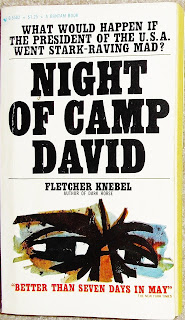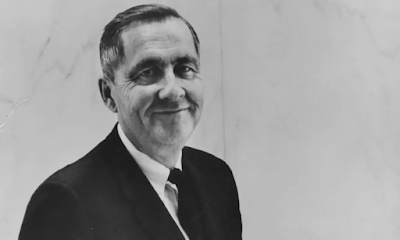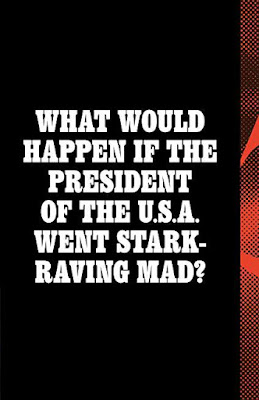The
horrifying premise of Night
of Camp David
when it debuted in 1965, that a U.S. president could go insane with
his finger on the nuclear button, had gained some subtlety when it
was re-published last year. Its focus when it first appeared two
years after JFK's assassination and three after the retrospectively
prescient Seven
Days in May, shifted
our fears away from a president
in danger
to a dangerous president. Both books were bestsellers, and Seven
Days
became a top-rated movie. At first blush Camp
David's
reappearance three months ago seems more like political commentary.
The new cover's white lettering on a black background, screams:
WHAT
WOULD HAPPEN IF THE PRESIDENT OF THE U.S.A. WENT STARK RAVING MAD?
Something sinister peeks at us from its red-toned margin.
The gamut
of emotions this cover ignites has expanded from the thrilling
wonderment of '65 to the mushrooming cloud we find today, including everything from comic to
tragic, with hysteria and its countless sublimations squirming
against each other in between. There's a saying in publishing that
the product is not the steak, it's the sizzle. Problem with reading
Camp
David
now is the sizzle has swallowed the steak. Time has so outstripped
the plot's suppositions they seem quaint in today's light:
a
junior senator from Iowa, alone with a popular president in the
presidential hideaway at Camp David, watches the president suddenly
come unglued with paranoid conspiracy notions, a plan to tap every
phone in the US, and a quest to link up with Canada and Scandinavia
to create a world order. He tells the senator he wants him on the
ticket as his VP in the next election. O lort, what to do, what to
do...
Who can
Sen. Jim MacVeagh tell? He's a popular senator, but is considered,
even by himself, to be a tad too laid-back and inexperienced for such
a weighty promotion. Who would believe him if he tried to bring what
he's seen and heard to light? Who would dare even whisper that a
popular president—or any
president—might have lost his marbles? But MacVeagh must do
something. There's a summit coming up in a couple of weeks with the
hard-nosed Russian premier. Something unthinkable could happen if the
president is allowed to attend. No no no, can't let that happen!
Anyone
laughing yet? Not trying for sarcasm here, yet we know many—perhaps
billions worldwide—feel deeply alarmed that such a scenario is a
real possibility, already convinced the US president is bonkers. This
widespread feeling varies fundamentally from the Camp
David plot
in which only a
tiny group of government insiders ultimately knows the score. The
public’s never the wiser.
Fletcher
Knebel penned Night
of Camp David
still breathing afterburner vapor from Seven
Days in May,
which he co-wrote with Charles Bailey. Both books caught fire in the
imagination of a public still sighing with relief following the Cuban
Missile Crisis with its US-Soviet nuclear brinksmanship.
Insularity
at the federal government’s upper reaches was taken for granted
when Camp
David
appeared, but so much has happened since then, as the explosion of
electronic media and communications has opened access to even the
weeest Tweetable whims of our most powerful officials. During
Watergate, fearless news reporting and secret White House tapes
provided insight to the unguarded mechanics of governance, spawning
popular conclusions that our Quaker president was a foul-mouthed,
paranoid felon. Today a vast cross-section of our populace would rank
Nixon with Caesar’s wife in the comparative light of daily
revelations out of Washington. But the president remains in power, as
Nixon remained in power until he resigned, albeit under duress but
nonetheless stepping down with the dignity of liberty, in neither
straitjacket nor cuffs.
Proving
anyone legally guilty of a crime or of being mentally ill is a
process ordinarily requiring lengthy due process. Secretary of
Defense Sidney Karper, who becomes the first official to share
MacVeagh’s suspicion the president is nuts, warns him, “Nobody
in this country can tell a president of the United States that his
mind is sick.” Karper has headed a study to ensure that neither of
the three officials charged with reaching consensus before launching
a nuclear strike can
act alone. These three are the president, the secretary of defense
and the chairman of the Joint Chiefs of Staff. The president alone
has the final authority, but in practice the other two have to advise
him that a nuclear strike is justified. In theory, Karper tells
MacVeagh, the president can overrule anybody, but it’s deemed
highly unlikely he or she would reverse both of the other two
officials. Ultimately the defense secretary’s study failed to find
a fail-safe mechanism to insure the sanity of all three “command
authorities.” The biggest sticking point seemed to Karper to be the
impossibility of legally keeping a mad president’s finger away from
the button. And trumping that difficulty, how to determine if a
president is truly mad.
The two join forces when
MacVeigh finds Karper’s been conducting his own investigation.
Karper, who has his own personal evidence of the president’s
unhinging, admits he’s told no one else nor has any idea how to
proceed. They agree that together they’ll have the credibility to
enlist other top officials. Is so, what then?
Notwithstanding
the plot’s anachronisms, Night
of Camp David
still reads like a thriller, as the young senator and the brilliant
cabinet official gradually gain traction in their desperate effort to
keep a president they’re convinced has slipped off his mental
trolley from meeting with the Russian leader.
“Jim,”
Karper tells MacVeigh, “this whole affair has convinced me of one
thing. The mental business is almost impossible to handle at the apex
of government. We thought the disability problem was solved when the
succession amendment was passed and ratified in the Johnson
administration. But it isn’t, is it? If [the president] comes back
and claims he’s normal, but we have evidence he isn’t, then the
fight would rip the government apart—with God knows what dangerous
results abroad.”
For a
fascinating British viewpoint on the book’s reissue, bluntly
applying its theme to current US presidential problems, read Tom
McCarthy’s review in The
Guardian.




I love the movie Seven Days in May and we have watched it many times. I have a copy of the book and hope to read it sometime this year. I did not know much about Knebel's writing. I think I would like to try more of his books, but I will stick with Seven Days in May for now.
ReplyDeleteI'd thought Night of Camp David was a movie, too, but evidently it wasn't. I read it when it was first published, and remembered a lot of it when I re-read it this week. Except this time the irony was thick as fog. Still a good read, if only for the inside look at Washington politics. Knebel was a DC journalist before he started writing novels.
Delete